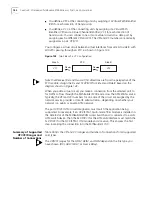
Configuring Virtual Circuits
195
Setting up a PRI PBX Tie Line
PRI signaling is a type of CCS (common channel
signaling) in which one channel (24) is used to signal for the other channels (1-23).
This is in contrast to CAS (channel associated signaling) in which signaling is done
on all channels.
You can set up a PRI PBX tie line that allows structured data to be passed across a
structured data port. To do this, follow these basic steps:
1
Set the CBR
Port Mode
to
Structured Voice
. See “Configuring DSX-1 CBR or E1
CBR Modules” earlier in this chapter for details about setting CBR port
parameters.
2
For channel 24, build a structured data virtual circuit with on-hook detection
disabled.
3
For channels 1-23, build individual structured data virtual circuits for each DS0 you
will actually use, with on-hook detection enabled.
QSIM/HSIM/FAM Virtual Circuit Parameters
The parameters that appear on the QSIM, HSIM, or FAM Add Virtual Circuit screen
vary, depending on the configuration of the serial port that is being connected:
Frame Relay, DXI, or HDLC/SDLC.
The following virtual circuit parameters are specific to QSIM/HSIM/FAM cards:
The configuration of the card you select on the List Card menu sets the attribute
selection for the virtual circuit configuration parameters. If you configure a virtual
circuit and then change serial port attributes—from DXI to Frame Relay or vice
versa—the circuit will be deleted.
Frame Relay Virtual Circuit Parameters
If the serial port is configured as a
Frame Relay port, you must set the following virtual circuit parameters:
Interworking Mode
—The Frame Relay/ATM interworking mode:
Network
or
Service
.
Start Frame Relay DLCI—
The starting Frame Relay data link connection
identifier:
16...991
. DLCI is used to identify a Frame Relay local connection. In
Network interworking mode, contiguous values of DLCIs can be mapped to a VCI.
Many DLCI to One VCI mapping is supported as well as One DLCI to One VCI
mapping.
End Frame Relay DLCI—
The ending Frame Relay data link connection identifier:
16...991
. DLCI is used to identify a Frame Relay local connection. In Network
interworking mode, contiguous values of DLCIs can be mapped to a VCI.
Encapsulation Mode—
The encapsulation data goes around the data packet and
is used to identify the packet; select
1 (Transparent)
or
2 (Translation)
. This feature
is offered only for Service interworking mode.
Transparent
—Used for point-to-point frame relay interconnection. See
Figure 154. Frame Relay Forum 8 (FRF.8) Service Interworking for this is being
implemented. There are two modes at which FRF.8 specifies a mode which is
transparent and is in fact 1490 over ATM.
Summary of Contents for 3C63400-3AC-C - PathBuilder S700 Switch
Page 14: ...xiv CHAPTER SUPPLEMENTARY REGULATORY INFORMATION ...
Page 18: ...4 ABOUT THIS GUIDE ...
Page 28: ...14 CHAPTER 1 SYSTEM DESCRIPTION ...
Page 88: ...74 CHAPTER 3 GETTING STARTED ...
Page 260: ...246 CHAPTER 6 PATHBUILDER S700 DIAGNOSTICS AND PERFORMANCE MONITORING ...
Page 270: ...256 INDEX ...
















































